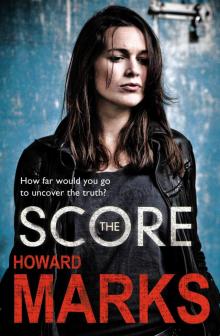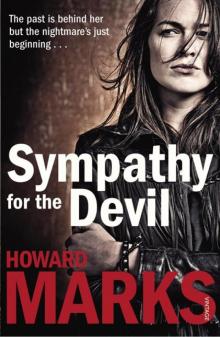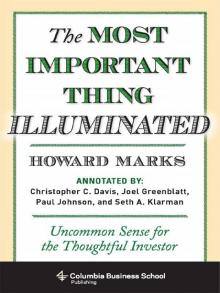- Home
- Howard Marks
Sympathy for the Devil Page 2
Sympathy for the Devil Read online
Page 2
She followed him down to the car. It was cold, the heater blew freezing air around her feet. They drove without talking through the terraces of Bute towards the waterside.
At the lower crossroads Rhys began tracking along the radio dial. All the stations were playing Face’s old hits, the talk shows going over what had gone down at the gig and the bridge. When Rhys hit the end of the dial he turned it off. Catrin could hear snatches of Face’s low, murmuring voice still playing through her head. She began humming to shut the sound of it out.
She turned to Rhys in the darkness, put her hand lightly on his thigh. ‘It’s there in Face’s lyrics,’ she said. ‘What he did tonight, it was like a self-fulfilling prophecy.’
‘Which lyrics?’
‘That one about the snow. I’ll walk across snow without leaving footprints.’
‘That could just be a reference to his anorexia.’
‘Anorexia? It’s an unusual condition for a man.’
‘Well, Face was an unusual man.’
As they got closer to the water they passed several BBC vans down from Broadcasting House in Llandaff. Beside them Catrin recognised the Asian reporter from Sky News, his scarf the only point of colour among the columns of black-clad Goths silently filing past. On both sides of the road were more OB vans, their satellite dishes silhouetted in the dim light of the candles cupped in their hands by the crowd.
As they neared the block where Face had lived the bodies tightened around the car. The headlights picked out a flash of feather boas and sequins, some girls rushing forward, their make-up smudged with tears. Locals from surrounding pubs were waving their arms at each other, bobbing forward in the quickening flows of the crowd. For a moment the road ahead appeared blocked by some form of queue. A man was standing in a doorway, letting in one person at a time. There was a glimpse of a stairway up to a flat, a view down onto Face’s street and the waterfront.
‘Typical. The guy’s only been gone five minutes and already someone’s making a few quid off him.’ Rhys held his warrant card out of the window, his hand on the horn. They passed a couple of uniforms standing beside some transparent evidence bags. Inside Catrin saw the limbs of a shop dummy, the type that would be light enough to float, a black leather jacket and wig. But no one seemed to be paying the find any attention. The crowd was pushing forward towards the end of the street. All eyes were focused now on a slim female figure standing on something raised behind the cordon.
In the roped-off rectangle in front the press were gathered. The woman’s face was hidden by the mikes clustered around her. But Catrin already recognised the lean, taut figure and rod-straight black hair. It was Della Davies, the senior press officer from Area Headquarters.
The woman rested one hand on the hip of her tight ski-pants, her patent jacket glinting in the lights. She looked like she was striking a pose at the end of a runway rather than briefing on a dead man.
Catrin felt a sudden surge of anger. She’d heard the talk around the station, that Della had her eye on Rhys, that there was something between them. The call was that Della was the sort who always got what she wanted in the end, always got her man. Or woman: she walked both sides of the street. And at that moment Catrin didn’t want to look at Rhys. She didn’t want to see what his face might betray.
Against the Dellas of the world she’d never stood a chance. She’d been brought up by a chaotic hippie mam, whose idea of beauty was henna, patchouli, tie-dye smocks. Scratch the surface, she was still gawky, childlike, that tomboy who never wore skirts, hid herself behind boys’ kit. Any man who stared at her too long, she thought there was something wrong with him, didn’t trust him. But Della – Della soaked up men’s gazes like it was her birthright, always looked like she’d just spent the last five hours in a day spa. Her effect was sleek as a doll, a perfect shiny shell but what was inside no one seemed to know.
‘Yes, for the last time, I can confirm Mr Face’s body has not yet been recovered.’ Through the freezing air Della’s throaty voice carried over the hushed crowd. The Sky reporter was jostling his way to the front, holding a mike up under her plumped-up lips.
‘So when the tides go out, where do you expect the body to be lying?’ he asked.
‘I can’t speculate on that. We’ve got some of the strongest tides in the world here. Sometimes it can take several months before bodies are found.’
‘Then why not let us through, what are you hiding back there?’ The voice was American this time, young and reedy.
‘We’re not hiding anything, sir.’ Della cast a disdainful glance in the direction of the voice. She ran her long nails briefly along the top of the panel. ‘These cordons are purely an issue of crowd safety.’
The Sky reporter still had his mike in her face. ‘Any other possible explanations for Face’s car being found abandoned at the suicide bridge?’
‘Nothing has been ruled out at this stage.’ For a moment Della lightly stroked the shaft of the mike before pushing it away. ‘And I’d remind you that the bridge is still open to traffic and can be popular with visitors taking in the views.’
‘But Face wasn’t a visitor, and since the new bridge was built, no one drives that way. His car was found after dark, so he was hardly going down there for the view. Are you saying the police are pursuing a line of inquiry other than suicide?’
‘No further comments.’ Della abruptly ducked away among the uniforms. As Catrin turned she noticed Rhys was staring at the spot where Della had disappeared.
‘Della’s certainly enjoying her fifteen minutes,’ he said.
‘Knowing Della, she’ll make it last longer than that.’ Catrin kept her eyes straight ahead as Rhys edged the car up to the cordon. He held up his card, the panel was lifted by a young WPC and they passed through. As they drove on into empty streets the hum of the crowd soon died away behind them. The only sounds were the lapping of the waves against the front, and out in the channel the chug of a motorboat, its dim form ghostly behind the banks of fog.
Rhys’s surveillance point was down the other end of the waterfront, but he didn’t seem in any hurry to reach it. He was slowly doubling back around the block into the street behind the cordon. All the time Catrin could hear the smooth whirr of a large car behind them. They were moving slowly, but it didn’t pass, just kept a steady distance behind.
In the rearview Catrin saw the car pulling up about twenty yards back on the deserted street. ‘Looks like someone wants you to stop,’ Catrin said quietly. Rhys’s shoulders tensed. He had slowed to a crawl, not looking round.
They waited, but no one got out from the car behind. She noticed Rhys checking the rearview for a moment before he opened the door. He said nothing. He was walking back into the headlights. Catrin turned and watched him disappear behind the glare.
Catrin saw only a single figure in the car. It was difficult to make out much, but she could see long straight hair, a jacket with a sheen to it. Whoever it was had left the headlights full on so they couldn’t be seen clearly.
Rhys was leaning through the window now. She thought she saw him putting something in his pocket. Then he was half running back through the glare as the other car revved, swerved off at speed towards the cordon.
Catrin caught the faint scent of a woman’s perfume as Rhys closed the door.
‘Who was that? Della?’
He shook his head as he settled back in his seat. ‘Nothing to worry about.’ He started the car, his eyes straight ahead as he moved towards the surveillance point.
Thirty yards further along he turned next to the pavement along the dock. To the right a small pontoon provided berths for four small boats, all of which looked in need of repair and a coat of paint. On the other side was a clear sightline up to the door of what had once been a late-night drinking club.
The place had been closed for months. Most of the local landlords had sold their leases to the seafront development companies. This whole area was a ghost town now, every building around them marked out for
demolition.
Catrin watched as Rhys lifted the night-sight Bushnells and camera into place on the console, focused on the front of the empty club. The lights were off above the doorway. Usually there’d be a couple of Somali lads just out of range of the CCTV above. Occasionally cars would pass or lads with heads down under their hoodies to buy a stone or a sixteenth, moving off into the alleys behind. But tonight with the cordon in place the pitch was deserted, no sign of passing trade.
It was the watching unseen that had first turned Catrin on to police work, that and seeing patterns where there didn’t seem to be any at first. But now there wasn’t much for them to look at, just the fading posters on the wall, the view across the bay shut out by the fog. She reached her hand across in the darkness, held Rhys’s, letting her face rest against his chest. He opened the glove compartment and took out a tube of Fruit Pastilles.
‘Want one?’
She took a lime one, slipped it in her mouth without chewing.
‘You knew there’d be nothing here tonight,’ she said. She held the pastille against her cheek with her tongue. ‘Why come down? What were you expecting to see?’
Rhys lowered the binoculars.
‘I don’t know. I’ll only know when I see it.’
A few insubstantial flakes landed on the car window, melting almost immediately. Catrin shivered, hunkered down inside her parka. Only ten minutes had passed, but her feet already felt cold.
‘This is all just bullshit.’ She pointed at the empty street. ‘You came down because you knew she would be here.’
‘Who’s she?’ he said casually.
‘Oh please.’ Catrin put her hand in Rhys’s pocket, and felt his hand on her wrist. She thought he was going to stop her, but he didn’t. At first her fingers found only the little folded papers he used to make his origami birds. Immediately she began to feel ashamed for doing this, for doubting him. She laid the papers out on her palm. A swan, an owl, a raven. Then she felt something else, wrapped in cellophane. She knew what it was before she even took it out.
‘What the fuck’s this? Why isn’t it in an evidence bag?’
He shrugged, said nothing. It would have been so easy for him to lie, but he just said nothing. She held it closer to the light. It was a wrap, just as she’d thought, the cellophane transparent, burnt at the corner to seal in the brown heroin powder.
‘Della gave this to you, didn’t she?’
Rhys was looking away down the street, avoiding her eyes. She felt a pain now in her temple as at the onset of a fever, a sudden emptiness in her stomach, that feeling she had whenever she looked down from heights and there was nothing dividing her from the fatal emptiness beneath.
She touched his cheek, tried to make him look at her. ‘What’s so bad,’ she said softly, ‘that you have to do this to yourself? Is it a case? I thought we shared everything.’
He remained still as a stone, staring out into the night. She tried to force herself to think positively. He’s never lied to me. He could have, but he didn’t. Maybe he wanted me to know, maybe he was just waiting for this to happen. Maybe he couldn’t bear to hide it from me any more.
‘Whatever’s hurting you, I can handle it,’ she said. ‘You don’t need to protect me, not any more.’ He still said nothing. She heard her own voice trailing off. Sometimes the truth couldn’t be sugar-coated. He’d been using and she hadn’t even seen the signs. She’d been trained to read those signs, but so had he, he’d known how to cover up. He’d committed original sin for a drugs officer, and what was worse he hadn’t turned to her for help, he’d kept it hidden.
She tried to swallow her anger but couldn’t stop herself. She heard her heels on the pavement, the slam of the car door behind her before she was even aware she was moving.
She walked fast through streets she had known all her life. She could have kept her eyes closed and still found her way home. On the other side of the street she saw a solitary figure, a young girl. A stray from the crowds at the docks maybe. It was late for her to be out. The child was doing everything to avoid drawing attention to herself, head down, taking fast, small steps. Catrin wanted to follow the girl to make sure she was safe, but already she was losing sight of her. The girl broke into a run, weaving between the pillars of the low-rise flats then disappearing into the blackness.
Around one corner, then another and Catrin passed a barber’s pole above a charred hole in the brickwork, then under the shop sign over another boarded-up front. Most of the houses beyond were covered with metal sheets to keep squatters out, awaiting demolition. These streets would disappear soon to make way for the new waterfront developments, and for a moment her mind was filled with a vision of all the lost souls who would continue to pace them in their dreams until their dying days.
The curtains were pulled across the windows of her mother’s house, no lights visible from the street. The fairy lights still not taken down from previous Christmases, now a permanent feature, gave out not even a flicker. Catrin went down the path to the back door. She moved quietly up the steps between the troughs that had once held pink flowers she’d never known the name of. She was aware her mother might already be sleeping, and didn’t want to wake her.
Catrin was trying hard not to think about what had just happened, but the harder she tried not to picture it, the more it ran through her mind. Maybe it hadn’t even been Della in the car behind. She had to hang on to that possibility. Maybe Rhys had just forgotten to slip the wrap into an evidence bag. There could always be innocent explanations for things. If you looked at them in a certain way, didn’t look at them too long. The trick of making life bearable, a life like hers where she was paid to think the worst of people.
Through the hallway she went into the kitchen. She could hear the sound of a television from the next room, and out over the water the sound of the choppers just a distant thrumming. She stood at the door, but the room was empty. The light flickered over a tracksuit hung over the back of a chair. It was one of the wooden dining suite her mother never used. Her mother didn’t come downstairs often now, and when she did she always ate her meals on her lap on the threadbare sofa that faced the television.
Catrin stood at the sink and ran the water until it was so cold it seemed to burn her fingers, then she went upstairs. When she flicked the switch the hallway remained dark. The bulbs hadn’t been replaced. In the street light she could just make out the patch on the wall where the Salem picture had hung, the proud old woman at chapel with the devil’s face showing in the folds of her shawl. Dust-sheets covered the furniture waiting for the council to take it to the sheltered housing where her mother was being rehoused.
The door to her mother’s room was closed. She stood with her ear to the peeling paintwork, could hear nothing within. ‘Mam,’ she whispered. But there was no reply. Through the crack came the flicker of the gas fire. She opened the door silently and peered in. Her mother lay unmoving on the bed, her chest slowly rising and falling. Her face in the glow of the fire looked hollowed out, pale from all the medication and so many months indoors.
Catrin went over, drew the blanket gently up to her mother’s neck. When she bent and kissed her forehead it felt cool, dry, as if it had been buried in parched earth. She wondered how long her mother had left now. She’d asked the doctors enough times and always they’d said the same thing. They didn’t own crystal balls, they couldn’t see into the future. It sounded as if they were trained to say it.
Even in the dimness she could make out the marks where the cupboard and armchair had stood, and where the rug had lain for so many years. Beside the bed the packing case was covered with her mother’s cigarettes, her blister packs of pills, her many lighters and dog-eared Mills & Boons. Catrin tried the lighters one by one, but they were all dead.
Beside her she heard the shallow rasp of her mother’s breathing, her eyes half open but seeing nothing. In her sleep her mother was rolling over, her arms reaching around the pillow, cradling it close to her. Catrin drew
back the tie-dye cloth hung over the dusty window and looked out into the night.
In the moonlight the frozen grass glistened. The clothes hanging on the makeshift line should have been brought in hours ago. When she goes to bring them in in the morning they will be stiff as cardboard, Catrin thought.
At the bottom of the yard a cat moved among the bins. In the window opposite an Asian family were eating their dinner together, they could not see her watching them. Like everything that night they felt like something glimpsed on a distant screen.
SEPTEMBER 1998
‘Catrin.’
She opened her eyes. It was dark still, but she could make out a vague movement near the door.
What time was it? Morning? She turned and looked at her alarm clock. Two a.m. No wonder she felt strange, she’d only been asleep an hour.
She could make out a man crouching by the door.
There was something in his hand, something long and dark. He was wearing a loose tracksuit, the hood pulled up. He was still, absolutely still, and he was watching her.
‘Catrin.’
Her heart leapt. That’s what had woken her, the sound of Rhys’s voice. He’d come back to her. She waited for him to hit the switch, then opened her eyes again slowly.
‘Oh Rhys,’ she said, ‘you look terrible.’
He hadn’t come home for two weeks and now she noticed all the things she’d got used to when she saw him every day. The state of his clothes and the way they hung off his body, the state of his skin, the pallor, the dullness of his eyes. The drugs and the not eating: his life was destroying him from the inside out. He’s come back because he knows I’m the only one who can save him, she thought.

 Mr Nice
Mr Nice The Howard Marks Book of Dope Stories
The Howard Marks Book of Dope Stories Senor Nice: Straight Life From Wales to South America
Senor Nice: Straight Life From Wales to South America The Score
The Score Sympathy for the Devil
Sympathy for the Devil The Most Important Thing Illuminated
The Most Important Thing Illuminated Senor Nice
Senor Nice Howard Marks' Book of Dope Stories
Howard Marks' Book of Dope Stories